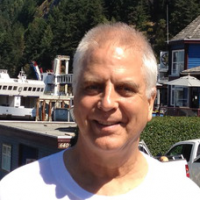 A few days before I went through the experience of bliss described in “I Could Get Used to This,” (1) I went through almost a full day immersed in an ocean of love.
A few days before I went through the experience of bliss described in “I Could Get Used to This,” (1) I went through almost a full day immersed in an ocean of love.
My experience closely fit what Third Zen Patriarch Sosan describes here:
The Great Way is effortless
for those who live in choiceless awareness
To choose without preference
is to be clear.
Even the slightest personal preference
and your whole world becomes divided.
To perceive reality as it is
is to live with an open mind. (2)
What he says is so beautifully apt, but it’s very difficult, before one experiences the state he’s pointing at, to understand what he’s saying and why he says it. But the minute you’re in the space of love – that is, flooded with love because love is no miser – what he’s saying becomes crystal clear.
I’ll do my best to explain. One can remain in the center, in the balance point, in the heart and still choose. This is what he refers to as “choiceless awareness.” One is simply present, but that doesn’t preclude one’s ability to say “yes” or “no” to something.
But one cannot remain in the center and have preferences. Preferences, by their very nature, take us out of the center and give us a leaning. To stay in the center, we must lean neither to the left nor to the right.
One could argue with life and say “That isn’t fair. I should have the right to my preferences.” And we do. But it still doesn’t matter. We simply cannot experience the deeper states that depend on stillness of the mind – the windless place, the still water – if we insist on hankering for, being drawn to, and pursuing this or that in the material world.
Preference is an aspect of desire. Because we’ve enjoyed something, we desire to have it again. Preference is desire projected into the future.
Our preference is the leaning towards that thing that we generate to remind us that we want it next time we encounter it. It increases our likelihood of getting it again.
The quieting down of preference came as a feature of a space that I was in from the moment I woke up till about 4 in the afternoon.
I keep saying this next thing over and over again. Yes, I’m repeating myself. It’s because the distinction is so important, so connected to understanding what Sosan is saying.
It’s the space that eliminates preferences. It’s the space that immerses one in bliss. We tend to think that what we do and don’t do is important for enlightenment. No, it’s the space itself that needs to be recognized. Here I go again repeating Sri Ramakrishna’s apt analogy: Walk into the lake. Run into the lake. Jump into the lake. The important thing is to get ourselves into the lake, the space.
Another word for space would be vibration, frequency. I suppose you could also say dimension and plane of existence.
We need to take our attention off the doer and notice the space. Gosh, I’m not sure if I put that clearly.
When we notice the space and the importance of it rather than of what we do or don’t do, then we start to allow and surrender to the space. Hallelujah!
And when we find ourselves in bliss, we have no desires and so no preferences or issues or trauma and drama. But then, if, in the space, we generate a preference and attach to it, we’re drawn back into the world of strong choices, which takes us away from our center, which takes us out of the space, out of the bliss, out of the love.
Yes, that’s as clearly as I could possibly put it.
That doesn’t mean I’m suggesting you stop personal development and just sit there regarding the space. No, go on about things as you’ve been doing. I’m simply asking for a change of one idea for another. Just one idea, out of billions.
Change your mind on which of these two is more important to enlightenment: (1) Our personal efforts; i.e., what we do or don’t do, and (2) Our personal recognition of and surrender to the space.
I say it’s the latter. Maybe that’s why enlightened beings break out into laughter when they realize what it took to become enlightened: simple surrender to and recognition of the space of what we today would call “higher dimensonality.”
I maintain that all of what I’ve just said is what Sosan is pointing to.
I’d like to circle back now and examine the space and more about what it taught me about preferences in a continuation of this article.
(Continued in Part 2.)
Footnotes
(1) “I Could Get Used to This,” May 16, 2015, at https://goldenageofgaia.com/2015/05/16/i-could-get-used-to-this/.
(2) Sosan, Hsin Hsin Ming. The Book of Nothing. A Song of Enlightenment. Kansas City: Andrews McMeel, 2002, 16.

